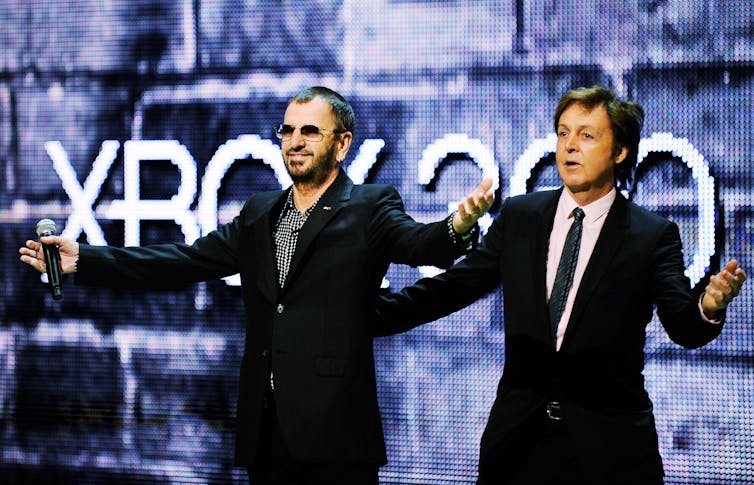Filmmaker Peter Jackson and Paul McCartney accentuate the positive as if to paper over the acrimonious history of lawsuits, the loss of the Lennon-McCartney publishing catalog and the solo careers that followed, writes Tim Riley.

By Tim Riley
Emerson College/ The Conversation
 In the new film “The Beatles: Get Back,” “Lord of the Rings” director Peter Jackson tries to dispel the myth of the Beatles’ breakup.
In the new film “The Beatles: Get Back,” “Lord of the Rings” director Peter Jackson tries to dispel the myth of the Beatles’ breakup.
In 1970, Michael Lindsay-Hogg released “Let It Be,” a film documenting the band’s recording sessions for their eponymous album. The movie depicted George Harrison arguing with Paul McCartney – and it hit theaters shortly after news of the band’s breakup emerged. Many filmgoers at the time assumed this depicted the days and weeks during which everything fell apart.
By the time it hit theaters, nearly 16 months after filming, this rehearsal footage got mistaken for a completely different time frame.
In 2016, Jackson gained access to Lindsay-Hogg’s original footage. Over the course of four years, he edited it into an eight-hour, three-part series, thanks to a streaming deal with Disney+.
In their press rounds, both Jackson and McCartney have been eager to recast the legacy of this period.
“I kept waiting for all the nasty stuff to start happening, waiting for the arguments and the rows and the fights, but I never saw that,” Jackson told The Guardian and others. “It was the opposite. It was really funny.”
“I’ll tell you what is really fabulous about it, it shows the four of us having a ball,” McCartney told The Sunday Times after seeing the film. “It was so reaffirming for me.”
It seems to be working: A recent New York Times headline proclaimed, “Know How the Beatles Ended? Peter Jackson May Change Your Mind.”
A lot of these sessions contain the irrepressible gags that made the Beatles famous. (Lennon and McCartney singing “Two of Us” in grandiose Scottish brogue almost steals Part Three.) But in their interviews, Jackson and McCartney accentuate the positive as if to paper over the acrimonious history of lawsuits, the loss of the Lennon-McCartney publishing catalog and the lurching solo careers that followed.
A Muddled Chronology
The timing of the theater release of the “Let It Be” sessions seeded confusion over how the group unraveled.
“Let it Be” was shot in January 1969, just weeks after the “White Album” hit stores.
The band then put these tapes aside to work on the larger project they intuited from this material, “Abbey Road,” which they completed seven months later.
The split actually came at a September 1969 meeting, when Lennon told the others he wanted a “divorce.” They persuaded him to keep his departure quiet until the band completed some contract negotiations. Then, in March 1970, McCartney publicly proclaimed he was “leaving the Beatles” to release his first solo album.
An epic descent into suits, countersuits and press squabbles ensued. Harrison even wrote a song called “Sue Me Sue You Blues.”
Only in May 1970 did the “Let It Be” album and film come out, with the band’s messy divorce as the backdrop.
After the initial theater run, “Let it Be” fell from view. For decades, the only way you could get a glance of it was through a black market copy. The Andy Warhol-esque, so-real-it’s-boring verité style – the non-narrative approach then in vogue – flummoxed even 1970 audiences.
But because the “Let It Be” album and film came out after “Abbey Road” – which was released in September 1969 – it quickly got mistaken for telegraphing their breakup, a belief that the Beatles themselves seemed to internalize.
The Beatles’ own traumatic memories of this period kept the raw footage from this project in the vaults for over 50 years. In the meantime, bootleggers published nearly all of its audio.
Conflict Brewing
Now at significant remove, the remaining Beatles – McCartney and Ringo Starr – seem to have hired Jackson for a rescue operation, disingenuously dubbing the film a “documentary” when they, in fact, served as executive producers alongside their Apple Records directors, Jeff Jones and Ken Kamins.
In response to Jackson’s three-part series, which coincided with the release of a book of transcripts from the “Let it Be” sessions and McCartney’s songwriting memoir, “Lyrics,” media outlets around the world appear to have embraced this new version of history: that these sessions actually scanned as lighthearted, that – poof! – the scars had vanished.
But the strange and beguiling thing about Jackson’s edit rises from how it displays an unstable mixture of groove and conflict.
Despite the walkout from Harrison and continuous disagreements about what the project was – first a TV show, then a feature film and album, which needed a rooftop concert for a “payoff” – the band ultimately rallied to write the now-classic tracks “Something,” “Oh! Darling,” “Octopus’s Garden,” “She Came in Through the Bathroom Window,” and “Maxwell’s Silver Hammer,” along with Lennon’s “Polythene Pam” and “I Want You.”
So Jackson’s “Get Back” clarifies the Beatles’ resolve to resume work and put their extra-musical squabbles aside. The music pulls them inexorably forward, and they trust these early song fragments enough to carry them. They have had bust-ups and walkouts and uncertainties and failures, and always found their way through. For Lindsay-Hogg and 1970 audiences, this all seemed bewildering and tense – the band kept a tight lid on internal rows. To the Beatles themselves, and to anyone who’s ever worked to keep a band together, it felt about par.
Telling the average person to watch eight hours of freighted doubt and raw, undeveloped material is a big ask. As The Onion joked, “New Beatles Doc Gives Man Greater Appreciation For How Long 8 Hours Feels.”
But there is a moment in Part Two of Jackson’s series – the first day on the set when Harrison doesn’t show up – when the rest of the band sits around talking about the situation. McCartney suddenly goes quiet. The camera lingers on him, and you can see him drift into a thousand-yard stare as he contemplates the looming uncertainties. He doesn’t quite tear up, but he does look as unguarded as he ever does, and markedly tentative.
The moment catches hold because it’s so out of character – McCartney rarely displays himself unveiled, without pretense. The shot lingers and takes the measure of the man and the project, how much they have to overcome and how precarious everything suddenly feels.
In retrospect, the miracle is not that they finished “Let It Be,” but how these sessions served as the warmup for their final lap, “Abbey Road.” After upending expectations with the contrasting breakthroughs of “Sgt. Pepper” and the “White Album,” figuring out what to do next would have confounded lesser souls.
That five-decade gap where fans waited for a refurbished “Let It Be” tells you a lot about how fraught January 1969 seemed to its four principals – and how deep those scars went.![]()
Tim Riley, Associate Professor and Graduate Program Director for Journalism, Emerson College
This article is republished from The Conversation under a Creative Commons license. Read the original article.
The views expressed are solely those of the author and may or may not reflect those of Consortium News.
Support CN’s
Winter Fund Drive!
Donate securely with PayPal
Or securely by credit card or check by clicking the red button:


Guy, it’s a movie about the recording of the Let it Be/Get Back project, not about the breakup of The Beatles.
It’s like complaining that James Bond films don’t have enough newsreel footage in em. Two different things.
Both films (Get Back, 2021 and Let it Be, 1970) were made from the same Lindsay-Hogg directed footage and audio recorded during January of 1969.
With the Let It Be film, director Lindsay-Hogg was working on his film edit well into 1970, when the Beatles were breaking up and embroiled in problems with Apple and each other. There’s no doubt that all the public discord affected the story he wanted to tell and his editing decisions. The leit motif of the Let it Be film is the Beatles breakup.
With the Get Back film, director Peter Jackson decided to limit the story to what’s actually depicted in the footage and audio from January 1969, when the Beatles tasked themselves to write 14 new songs to be followed by a live concert. The gift of this film is in seeing the creative process closeup and in watching the Beatles, their families and their studio associates react to each other. It’s visually stunning, too, having been meticulously transferred from the original 16mm negative. It’s one of the most satisfying documentaries I’ve ever watched.
I can’t imagine how the reviewer found this film to be both didactic and a ‘gloss over.’
* By the way, the original Let it Be movie is being restored and is due to come out in the next year or two. Peter Jackson didn’t use any of the same footage from the Let it Be film. When the same scene is depicted in Get Back it’s done with takes from a different camera.
To the complainers: lighten up. What’s an occasional non-serious article in the scheme of life? If you’re so offended with this sort of article perhaps you should direct your time and energy into creating a news website devoted solely to your vision of how things should be.
I came of age at the same time that the Beatles burst on the scene in the US. My friends and I held our breath for the release of each new single and album. Frankly, I don’t care how amicable or acrimonious the breakup was. The music is what matters, and the “Let it Be” album is one of my personal favorites. In the classical music world, there were any number of great composers who were difficult people and miserable human beings (think Wagner). But the listener need only hear the music and ignore the personality that created it.
I have not yet decided whether I will watch the Peter Jackson documentary, as I do not subscribe to Disney+. I already have too many subs that I rarely, if ever, use.
From this documentary, it appears that The Fab Four were having a tremendous time of it, jokin’ and funnin’ with loads of love, so much so that they split up and never reformed. Odd, that.
They all were so young..were we really ever so nascent yet thinking in our minds that we were immortal and uncoquerable…
Not at all certain why Consortium News feels it important to weigh in on this whole subject, nor on whether the Beatles breakup, something involving some complicated individuals with many-faceted interests and issues was, as it seems at least to my eyes the author seems to be trying to frame it, can only be viewed in a binary sense as either starkly and clearly acrimonious or completely warm and fuzzy. Don’t you have better things to do?
Our founder Bob Parry heard the exact criticism when he wrote a series of articles on a scandal engulfing the New England Patriots football team. This is a newspaper. A newspaper offers different attractions to different readers. We regularly run reviews of films. No one can argue that the Beatles were not an important contributor to post-war US and British culture. If you are not interested in an article your local paper publishes do you throw away the entire newspaper, or just skip reading that one piece?
Well said except for one point: The Beatles were an important contributor to *world* culture. Their music and influence touched every continent.
Totally agree with you….Consortium News is one of the most reliable and informative news sites….But stuff about the Beatles belongs rather on an Entertainment-type site.